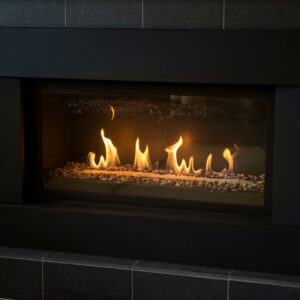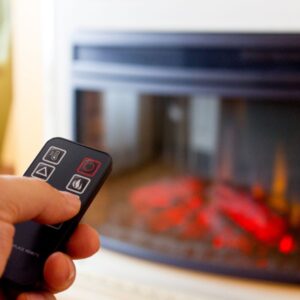Over the years, we’ve seen a lot of homeowners convert their wood-burning fireplaces or opt for alternative solutions when choosing heating appliances for their homes. Whether it’s full fireplaces, inserts, or gas logs, gas is growing in popularity as a preferred heat source. It’s not hard to understand why – gas fireplaces are easier to take care of and simpler to use.
All that said although they aren’t as high maintenance as their traditional masonry counterparts, they do still need regular inspections and repairs.
Is your fireplace acting unusually or making odd sounds that you’ve never noticed before? Don’t ignore it – call Legendary Chimney Solutions for an inspection. We work all over Eastern Central Florida and you can trust our team of certified technicians to handle all of your gas fireplace repairs and needs. Book an appointment online or call us at 386-999-1329.
What Are Common Problems With Gas Fireplaces?
It’s a common misconception that gas fireplaces don’t need to be serviced at all. Indeed, they don’t need as much attention as wood-burning fireplaces, but they do need a yearly once-over by a chimney technician certified by the Chimney Safety Institute of America (CSIA). Forgoing an annual inspection could put your gas fireplace at risk of developing issues that can grow into major problems down the line.
These are a few of the most common issues we see with gas fireplaces:
 The pilot light won’t stay lit. Most gas fireplaces have a pilot light – a small gas-fueled flame that should stay lit constantly. Occasionally, this light goes out and you won’t be able to start a fire. If you know where the pilot light is, you can relight it with a match or a lighter. But if it happens repeatedly, you should get it checked out by a chimney technician. It could be an airflow problem or an issue with the wiring or thermopile – all of which need professional intervention.
The pilot light won’t stay lit. Most gas fireplaces have a pilot light – a small gas-fueled flame that should stay lit constantly. Occasionally, this light goes out and you won’t be able to start a fire. If you know where the pilot light is, you can relight it with a match or a lighter. But if it happens repeatedly, you should get it checked out by a chimney technician. It could be an airflow problem or an issue with the wiring or thermopile – all of which need professional intervention.- The flame is flickering or weak. The flame of your gas fireplace should be steady and blue-to-yellow in color. A change in the color or the height of the flame could be a sign that there are clogs in the burner or that the gas supply levels need to be checked.
- Strange sounds are coming from the fireplace. No one likes sudden, strange noises coming from any of their household appliances, let alone a gas-powered one. A damaged blower could cause grinding or shrieking sounds. Roaring and rumbling might just mean your gas fireplace needs a good cleaning.
- Faulty ignition. If your gas fireplace struggles to ignite – or doesn’t ignite at all – there’s likely an issue with the ignition system. We see malfunctioning ignitions quite often, and they’re caused by a few different things. During an inspection, we’ll take a good look at the gas valve and pilot light. (Tip: If you notice other gas appliances in your home are having similar problems, the gas supply line is likely at fault and you should get in touch with your gas company).
- You can see a buildup of soot or black deposits. Soot shouldn’t be much of an issue if you’re keeping up with normal cleanings, but if you start to see excessive or odd-looking buildup, there may be a ventilation problem, the fireplace isn’t getting enough oxygen, or the burners are blocked.
- Foggy or cloudy glass. This isn’t unusual, so don’t panic. After using the fireplace for a while, minerals from the smoke will cling to the glass and it will look hazy or foggy. This will be cleaned during your yearly maintenance. (Tip: Don’t use ammonia-based household cleaning supplies on your glass fireplace doors. We have a specialized cleaner that’s safe to use and won’t interact with any fumes.)
- The fireplace shuts off by itself. If the gas fireplace turns off by itself after running for a while, it might be due to overheating, thermostat issues, or problems with the pilot system.
- You smell gas. Natural gas doesn’t have an odor, but most gas companies add chemicals to their supply which gives it that well-known “rotten egg” smell. If you suspect a leak, turn off your gas supply and call a professional immediately.
- Carbon monoxide leak. Carbon monoxide is a poisonous gas created when fuels such as natural gas, wood, propane, and gas burn incompletely. It’s completely odorless and colorless – that’s what makes it so dangerous. You should have a carbon monoxide detector installed near your gas fireplace, and be sure to check the batteries regularly. Signs of carbon monoxide poisoning include headaches, dizziness, or flu-like symptoms, and they require immediate medical attention.
Frequently Asked Questions
Q: How often do gas fireplaces need to be serviced?
A: You should clean ash and debris out of your gas fireplace at least once a month. It’s also important to keep up with annual inspections and professional cleanings by a certified technician.
 Q: What is the lifespan of a gas fireplace?
Q: What is the lifespan of a gas fireplace?
A: A moderately used gas fireplace that is cared for and well-maintained should hold up for 10 to 20 years. This time length can change if you’ve missed several inspections or if there are repairs that have been neglected over the years.
Q: My gas fireplace remote control isn’t not working, what should I do?
A: Try switching out the batteries first. If that doesn’t get it back on track, check the receiver. If you change the batteries in the remote and the receiver, but it’s still not connecting, try resetting it.
Q: Can I repair my gas fireplace myself?
A: We don’t recommend it. Gas is flammable and can be very dangerous to work with if you don’t know what you’re doing. If you think you have a problem, give Legendary Chimney Solutions a call and we’ll be happy to help!
Get in Touch Now – Hire Legendary Chimney Solutions for Your Gas Fireplace Needs
Having issues with your gas fireplace? Reach out to Legendary Chimney Solutions and let us get your fireplace back in working order. Don’t miss out on quality time by the fire when our knowledgeable team of technicians can take care of your repairs promptly and thoroughly.
Call us at 386-999-1329 or reach out for an appointment online.

Recent Comments